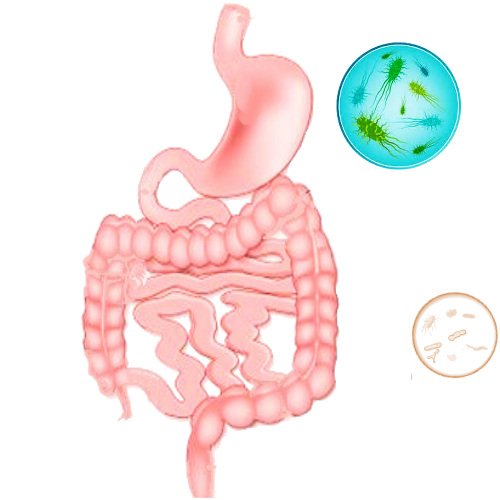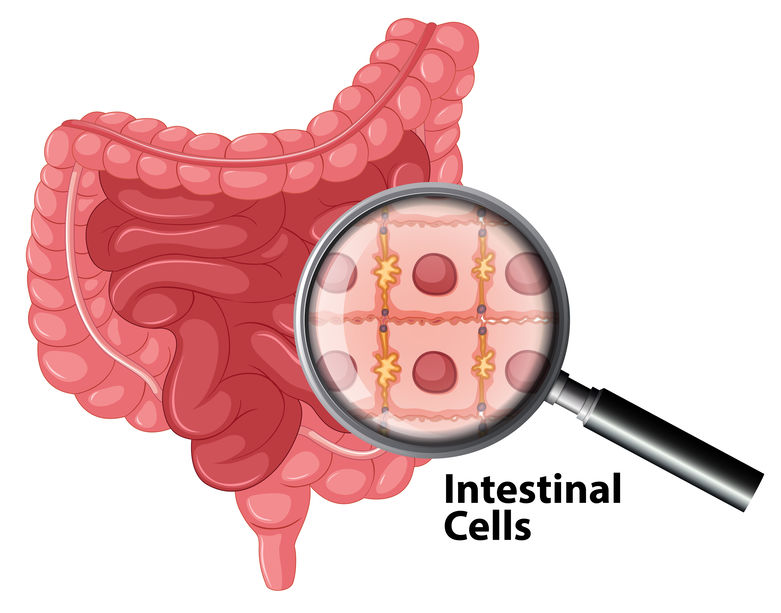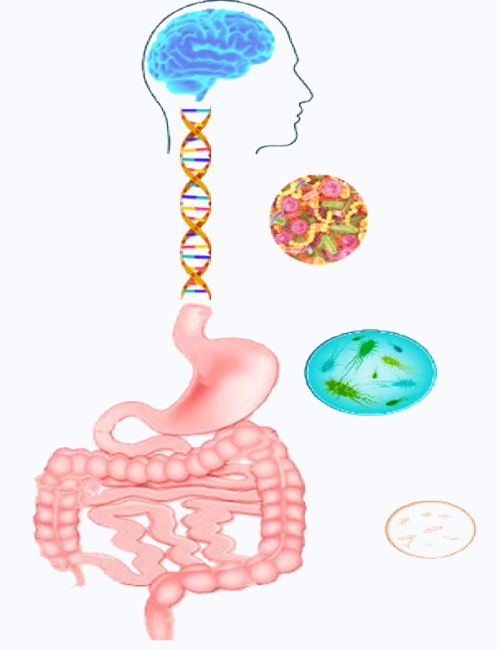GUT Support
Epigenetic Aspects of Functional Gastrointestinal Stressors:
How Dietary and Environmental Processes Contribute to the Development and Expression of Functional Gastrointestinal Disorders
While the Gut Page,within the Optimize Immunity & Wellbeing report, is not a diagnosis of any disease it does provide a wide range of indicators, which give an insight into potential gut stressors
The unprecedented modernization, which has taken place over the last three decades has brought with it a massive increase in environmental pollutants. These pollutants have impacted our daily lives in many ways.


One of the biggest impacts has been the stress caused to the Intestinal tract and Gut System. These two areas provide most of our cellular energies and play a major role in our immune systems .The function of these systems is equally important to our memory, as they influence the brains performance
When toxic pollutants entre the gut, dysfunction can occur.
The gut support page within the wellness report, indicates which nutrients can help optimize gut support. The more of the pointers that appear in the table below the higher level of optimization of gut support may be required.
Functional gastrointestinal disorders are complex symptom-based disorders without agreed upon biomarkers or pathophysiology. A better understanding of the epigenetic architecture of these disorders would help to better identify their complex biology and possibly explain the common comorbidity with other disorders of persistent pain, mood, and affect, as well as possibly make it possible to identify subgroups of patients who respond to life style and dietary changes. For instance, if there is a shortage of tryptophan or dopamine there could be a demand for probiotics which encourage the production of both. At least 50% of tryptophan or dopamine is produced in the gut.
Neurotransmitters are also produced in the gut, which impact hormones, that regulate the brains demand for apatite and also stimulate feelings of hunger or being full. The gut can also mimic lectin, P.Y.Y etc.
The food we eat creates specific microbes and therefore impacts the functionality of the cellular body. Some of our essential energies are created in the gut system, by way of Amino acids and vitamins digested from our daily nutritional food.
Epigenetic dynamics is based on prevention rather than diagnosis. Epigenetic influences impact the Gastro-intestinal system and can impact the later expression of symptoms associated with diabetes, pancreatitis, hepatitis, and Irritable bowel syndrome (IBS) as well as inflammatory bowel disease (IBD).
Epigenetic influences Genetic mutations have been identified as causing or enhancing the susceptibility for each of these diseases suggesting that alternative environmental factors regulate the disease incidence. In addition, these diseases have highly variable presentation between patients, and this variability is not fully explained by inherited genetic factors. In man y cases it is difficult for professionals to pinpoint the causes.
Family and twin studies have clearly established an epigenetic component in irritable bowel syndrome. Although candidate gene studies, have identified a few gene polymorphisms that may be correlated with the syndrome.
More specifically, epigenetic mapping can provide an overview of how the complex interactions of environmental, psychological, and biological factors contribute to the development Gastrointestinal Stressors

Locate Our Optimize Report Provider
Find a providerBecome Provider
Be a providerAll Cell Wellbeing reports are provided for educational and informational purposes only. They are non-diagnostic, do not provide medical or veterinary advice, and are not intended to diagnose, treat, cure, or prevent any disease or condition.
None of these statements have been evaluated by the FDA. This product is not intended to diagnose, treat, cure or prevent any disease or condition. It is intended to provide nutritional food information. The digital process uses We use In-Vivo rather than In-Vitro technology and therefore does not provide reproducible indicators as it reflects the constant changing epigenetic environment at the quantum biological level. For this reason, nutritional food optimization should only be considered every 90 days. it is NOT recommended that a new Optimized report be created within this period.
